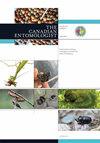Synergisitic Effect of Chitinases and Bacillus Thuringiensis israelensis Spore-Toxin Complex Against Aedes aegypti Larvae
IF 1.1
4区 农林科学
Q3 ENTOMOLOGY
引用次数: 12
Abstract
Abstract Six subspecies of Bacillus thuringiensis Berliner (Bt) were grown in minimal medium with chitin as the sole carbon source for 6 days to obtain Bt cell-free fermented broths, which were then evaluated for chitinolytic activity and tested against third-instar Aedes aegypti (L.) (Diptera: Culicidae) larvae. Bt Pakistani showed the highest chitinolytic activity (approximately >2700 mU/mL), Bt kurstaki showed the lowest activity (approximately <2000 mU/mL), and Bt thompsoni, Bt aizawai, Bt israelensis, and Bt alesti showed intermediate activities (approximately 2100–2400 mU/mL). Bt aizawai and Bt thompsoni broths showed the highest toxicity (LC50) against third-instar A. aegypti larvae (approximately <290 mU/mL). Bt kurstaki broth showed the lowest toxicity (approximately 420 mU/mL), while Bt pakistani, Bt israelensis, and Bt alesti broths showed intermediate toxicities (approximately 360–460 mU/mL). A purified and biochemically characterized Bt aizawai chitinase and commercial chitinases (from Serratia marcescens Bizio and Streptomyces griseus Waksman and Henrici) were evaluated and compared for synergistic effects on Bt israelensis spore-toxin complex against third-instar A. aegypti larvae. The synergism factor value of Streptomyces griseus and Bt aizawai chitinases were >2 and approximately 1.4; synergism was not evident for the Serratia marcescens chitinase (synergism factor value approximately 0.9).几丁质酶和苏云金芽孢杆菌孢子毒素复合物对埃及伊蚊幼虫的协同作用
摘要采用苏云金芽孢杆菌(Bacillus thuringiensis Berliner, Bt) 6个亚种在以几丁质为唯一碳源的最小培养基中培养6 d,获得无Bt细胞的发酵液,并对其裂解几丁质活性进行了评价,并对埃及伊蚊(Aedes aegypti, L.) 3龄幼虫进行了抑菌试验。Bt巴基斯坦菌株的几丁质溶解活性最高(约为2 ~ 2700 mU/mL), Bt kurstaki菌株的活性最低(约为2 ~ 1.4 mU/mL);粘质沙雷氏菌几丁质酶的增效作用不明显(增效因子约为0.9)。
本文章由计算机程序翻译,如有差异,请以英文原文为准。
求助全文
约1分钟内获得全文
求助全文
来源期刊

Canadian Entomologist
生物-昆虫学
CiteScore
2.20
自引率
11.10%
发文量
24
审稿时长
6-12 weeks
期刊介绍:
French translation follows/le français suit Published since 1868, this peer-reviewed bimonthly publication is the official journal of the Entomological Society of Canada. Available via the internet and with hardcopy distribution to 55 countries, its research papers and notes are relevant to entomologists and other biologists around the world. In addition to being a venue for topical reviews and forum discussion, The Canadian Entomologist publishes current research in all facets of entomology, including systematics and morphology, molecular and developmental biology, ecology and behaviour, biodiversity and evolution, insect management, entomological techniques, and other relevant subject areas. Contributions are published in English or French. Authors will not pay page charges, and will experience fast, high quality reviews of their papers.Publiée depuis 1868, cette publication bimestrielle avec comité de lecture est la revue officielle de la Société d’entomologie du Canada. Disponible sur Internet et distribuée en format papier dans 55 pays, ses articles de recherche et ses notes sont pertinents pour les entomologistes et autres biologistes de par le monde. En plus d’être une plate-forme pour des revues thématiques et un forum de discussion, The Canadian Entomologist publie la recherche actuelle sur toutes les facettes de l’entomologie, incluant la systématique et la morphologie, la biologie moléculaire et développementale, l’écologie et le comportement, la biodiversité et l’évolution, la gestion des insectes, les techniques entomologiques et d’autres domaines pertinents. Les contributions sont publiées en français ou en anglais. Les auteurs ne paient aucun frais de publication, et recevront une révision rapide et de grande qualité de leurs articles.
 求助内容:
求助内容: 应助结果提醒方式:
应助结果提醒方式:


